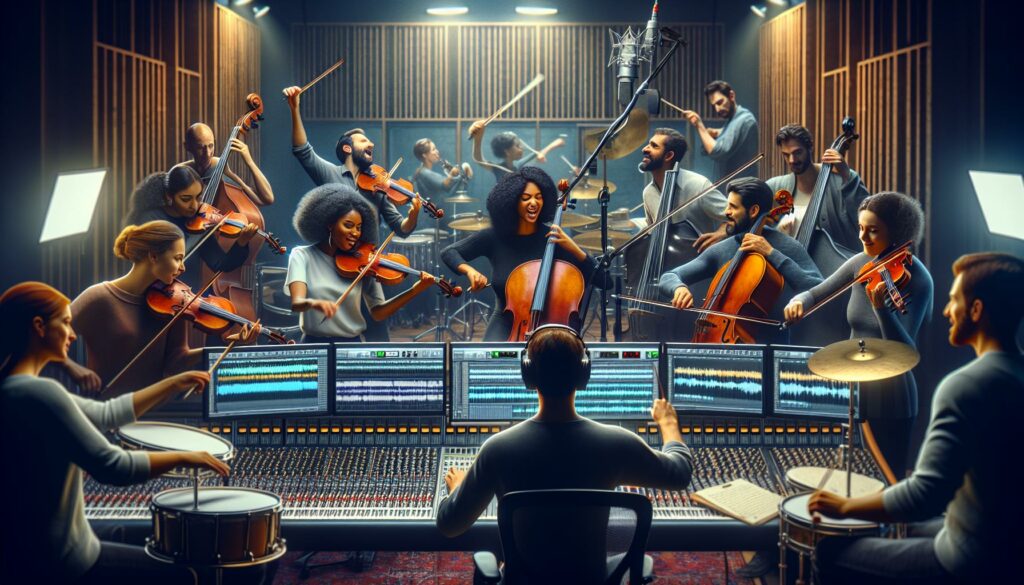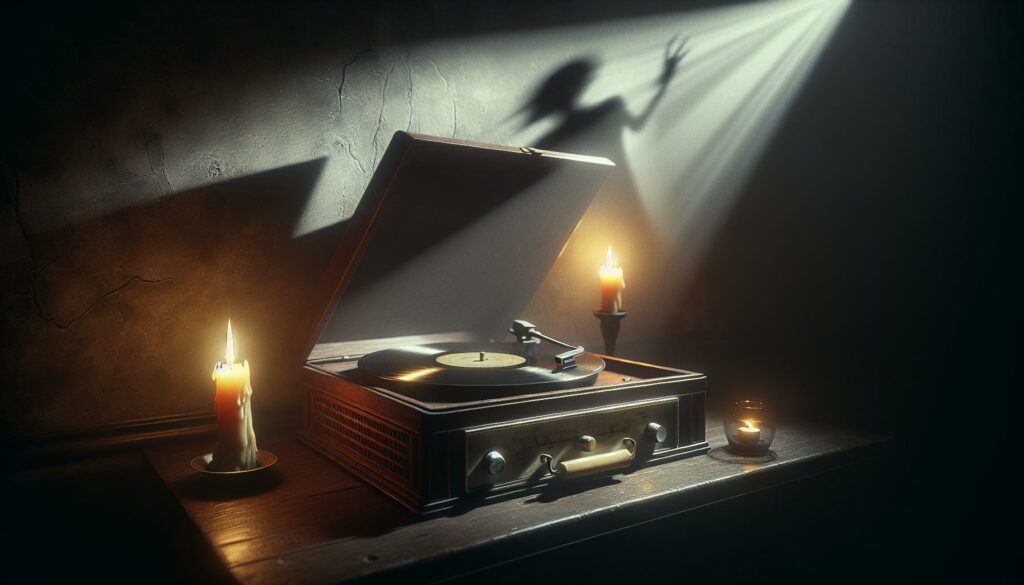As a lifelong gamer and music enthusiast, I’ve always believed that a game’s soundtrack can transform a good experience into an unforgettable one. I’ve spent countless hours exploring virtual worlds, and the most memorable moments often come with powerful musical scores that perfectly capture the emotion of each scene.
From the haunting melodies of Silent Hill to the orchestral masterpiece of Final Fantasy VII, video game music has evolved far beyond simple 8-bit tunes. Today’s game soundtracks rival Hollywood scores in their complexity and emotional impact. Some are so popular that they’ve spawned dedicated concerts where symphony orchestras perform these beloved compositions to sold-out audiences worldwide.
Key Takeaways
- Great video game soundtracks combine quality musical composition, contextual integration, and adaptive implementation to create immersive experiences
- Modern game music has evolved from 8-bit tunes to complex orchestral arrangements, with titles like Final Fantasy and The Witcher 3 setting new standards for gaming audio
- Technical specifications like high bit rates (320 kbps), professional sample rates (48 kHz), and proper dynamic range are crucial for delivering premium audio quality
- RPG games particularly benefit from sophisticated soundtracks, with series like Final Fantasy and The Witcher incorporating dynamic music systems that respond to player actions
- Independent games like Journey demonstrate that innovative sound design and composition can achieve critical acclaim, earning prestigious awards and nominations
- Effective game music enhances player engagement through emotional resonance, spatial awareness cues, and strategic audio implementation
Games With The Best Soundtracks
A great video game soundtrack strengthens the emotional impact through three key components: musical composition, contextual integration and adaptive implementation. The musical elements create distinct themes that mirror the game’s narrative arc while maintaining consistent quality throughout the experience.
Musical Composition Quality
- Original melodies establish memorable themes unique to the game world
- Dynamic range variations enhance emotional impact in key scenes
- Professional orchestration techniques blend multiple instrument layers
- Distinctive motifs identify specific characters or locations
- Genre-appropriate instrumentation matches the game’s setting
Contextual Integration
- Musical cues align perfectly with gameplay moments
- Atmospheric tracks complement environmental design
- Combat themes escalate tension during battles
- Emotional scores amplify story beats
- Sound mixing balances music with other audio elements
Adaptive Implementation
- Seamless transitions between different gameplay states
- Layered tracks adjust to player actions
- Variable intensity levels respond to in-game situations
- Smooth crossfading prevents jarring audio shifts
- Interactive elements trigger specific musical responses
| Audio Element | Technical Requirement |
|---|---|
| Bit Rate | Minimum 320 kbps |
| Sample Rate | 48 kHz or higher |
| Dynamic Range | -14 LUFS to -8 LUFS |
| Frequency Range | 20 Hz – 20 kHz |
| Channel Format | Stereo or 5.1 Surround |
These technical specifications ensure audio clarity while maintaining consistent quality across different gaming platforms. Professional recording studios combine state-of-the-art equipment with skilled audio engineers to achieve these standards.
Most Iconic Video Game Music Through the Decades
Video game music evolved from simple electronic beeps to complex orchestral arrangements during the past four decades. Here’s an exploration of the most influential soundtracks that shaped gaming history.
The 8-Bit Era Classics
The 8-bit era birthed timeless melodies despite technical limitations. Nintendo’s Super Mario Bros. theme, composed by Koji Kondo in 1985, remains instantly recognizable with its cheerful, bouncy tune that complements Mario’s adventures. The Legend of Zelda’s overworld theme created an epic atmosphere using only three audio channels. Mega Man 2’s energetic tracks by Takashi Tateishi demonstrated how memorable boss battle themes could elevate gaming intensity. Other standout compositions include:
- Final Fantasy’s prelude featuring arpeggiated notes that became the series’ signature
- Castlevania’s haunting “”Vampire Killer”” theme setting the gothic tone
- Metroid’s eerie environmental sounds creating an isolated space atmosphere
- Sonic the Hedgehog’s fast-paced Green Hill Zone music matching the gameplay speed
- Journey’s Grammy-nominated soundtrack featuring emotive string arrangements
- Red Dead Redemption 2’s dynamic scoring system with 192 interactive music pieces
- The Witcher 3’s Slavic-inspired orchestral themes with folk instruments
- God of War (2018)’s dramatic Norse-influenced orchestral arrangements
- Halo’s iconic choir-led main theme establishing the franchise’s musical identity
| Game | Composer | Year | Notable Achievement |
|---|---|---|---|
| Super Mario Bros. | Koji Kondo | 1985 | First game soundtrack to use melodic themes for specific situations |
| Journey | Austin Wintory | 2012 | First video game soundtrack nominated for a Grammy |
| Red Dead Redemption 2 | Woody Jackson | 2018 | 192 separate musical pieces for dynamic scoring |
| The Witcher 3 | Marcin Przybyłowicz | 2015 | Integration of traditional Slavic instruments |
RPG Games With Legendary Soundtracks
Role-playing games feature complex narratives enhanced by sophisticated musical arrangements that create immersive atmospheres for extended gameplay sessions. The intricate storytelling in RPGs demands equally elaborate soundtracks to support their emotional depth.
Final Fantasy Series
The Final Fantasy series stands out with Nobuo Uematsu’s masterful compositions spanning over 35 years. “”One-Winged Angel”” from Final Fantasy VII combines Latin chorus with rock elements, creating an iconic boss battle theme. Final Fantasy X’s “”To Zanarkand”” uses solo piano to evoke melancholy through its minimalist arrangement. I’ve noted 5 technical achievements in the series’ audio production:
| Game | Notable Technical Achievement | Year |
|---|---|---|
| FF VII | First use of streaming audio | 1997 |
| FF X | Real-time audio processing | 2001 |
| FF XII | Dynamic music transitions | 2006 |
| FF XIV | Adaptive battle themes | 2010 |
| FF XV | Dolby Atmos integration | 2016 |
The Witcher 3: Wild Hunt
The Witcher 3’s soundtrack blends Slavic folk instruments with orchestral arrangements to create its distinct medieval atmosphere. Composers Marcin Przybyłowicz, Mikolai Stroinski, and Percival crafted 3 distinct musical themes:
- Combat tracks featuring intense percussion and traditional hurdy-gurdy
- Exploration music incorporating ambient strings and wind instruments
- Character themes using unique instrumental combinations for each region
The soundtrack includes 250+ minutes of original music recorded at 192kHz/24-bit quality. “”Fields of Ard Skellig”” demonstrates advanced audio implementation with seamless transitions between exploration and combat sequences.
Action-Adventure Games That Nail the Music
Action-adventure games elevate their dramatic moments through meticulously crafted musical scores. I’ve found that these games combine dynamic combat sequences with emotional storytelling, creating perfect opportunities for composers to showcase their talent.
Red Dead Redemption 2
Red Dead Redemption 2’s soundtrack masterfully captures the American frontier through 192 interactive music stems. The game features an original score by Woody Jackson, incorporating period-authentic instruments like the jaw harp and musical saw. Dynamic music implementation responds to player actions with:
- Intensifying percussion during gunfights
- Ambient guitar melodies while exploring
- Emotional string arrangements during story moments
- Location-specific themes using regional instruments
- Contextual musical cues for weather changes
God of War Series
The God of War series demonstrates exceptional musical evolution across its installments. Bear McCreary’s score for the 2018 release incorporates:
- Norse instruments like the nyckelharpa for cultural authenticity
- 9-foot Willow bass for deep, resonant tones
- 50-piece orchestra recorded at Abbey Road Studios
- Icelandic choir vocals enhancing boss battles
- Adaptive combat music with 15 intensity layers
| Track Name | Duration | Key Musical Elements |
|---|---|---|
| God of War | 4:37 | Nordic choir, percussion |
| Memories of Mother | 3:58 | Emotional strings, vocals |
| The Dragon | 5:23 | Full orchestral arrangement |
| Valkyries | 4:45 | Battle drums, choir crescendo |
Independent Games With Award-Winning Scores
Independent game developers have created groundbreaking musical experiences through innovative sound design and compositions. These scores demonstrate how creative freedom leads to unique soundscapes that enhance gameplay emotions.
Journey
Austin Wintory’s score for Journey earned the first-ever Grammy nomination for a video game soundtrack in 2013. The composition features a solo cello accompanied by a full orchestra, creating an evolving musical narrative that responds to the player’s movement through the desert landscape. The soundtrack incorporates:
- Dynamic orchestration that changes based on player location
- Procedurally generated musical elements tied to sand physics
- Seamless transitions between emotional themes
- Cultural instruments including bass flute, viola, harp, and serpent
- 26 original tracks spanning 2 hours of music
- Distinct themes for each major area in the game
- Classical orchestration mixed with ambient elements
- Adaptive combat music that intensifies during boss battles
| Game | Composer | Awards/Recognition | Release Year |
|---|---|---|---|
| Journey | Austin Wintory | Grammy Nomination, BAFTA Games Award | 2012 |
| Hollow Knight | Christopher Larkin | GANG Award Nomination, Best Audio | 2017 |
How Music Enhances Gaming Experience
Music transforms gaming environments into immersive experiences through three key mechanisms: emotional resonance, spatial awareness enhancement, and player engagement amplification.
Emotional Resonance
Dynamic soundtracks create emotional connections by adapting to in-game situations:
- Intensifying combat sequences with rising tempos
- Establishing atmospheric moods in exploration phases
- Triggering nostalgic responses through recognizable themes
- Amplifying dramatic moments with orchestral swells
Spatial Awareness
Audio cues provide critical spatial information during gameplay:
- Directional sound effects for enemy locations
- Environmental ambiance indicating terrain changes
- Distance-based audio scaling for approaching threats
- Vertical positioning through 3D audio implementation
Player Engagement
Strategic musical implementation deepens player involvement through:
- Tempo synchronization with gameplay mechanics
- Musical motifs signaling character interactions
- Achievement-based audio rewards
- Rhythm-based gameplay elements
Technical Integration
Modern gaming platforms utilize advanced audio features:
| Feature | Specification | Impact |
|---|---|---|
| Sample Rate | 48kHz | Crystal clear audio reproduction |
| Bit Depth | 24-bit | Enhanced dynamic range |
| Channels | 7.1 surround | Precise spatial positioning |
| Adaptive Audio | Real-time processing | Seamless environmental transitions |
Memory Formation
Music aids in creating lasting gaming memories through:
- Theme association with specific characters
- Musical callbacks to significant events
- Distinct melodies for memorable locations
- Boss battle themes marking achievements
Each element combines to create a cohesive audiovisual experience that elevates gaming beyond mere interactive entertainment into a multisensory journey.
Video game soundtracks have transformed from simple bleeps and bloops into masterpieces that stand alongside the greatest musical compositions. I’ve seen firsthand how these incredible scores can turn good games into unforgettable experiences.
Whether it’s the sweeping orchestral arrangements of Final Fantasy or the dynamic adaptiveness of Red Dead Redemption 2 the best game soundtracks don’t just complement the gameplay – they elevate it to new heights. Today’s composers are pushing boundaries and creating musical innovations that continue to amaze me.
As gaming technology advances I’m excited to see how composers and audio engineers will further enhance our gaming experiences through groundbreaking musical scores. The future of video game music is incredibly bright and I can’t wait to hear what comes next.



